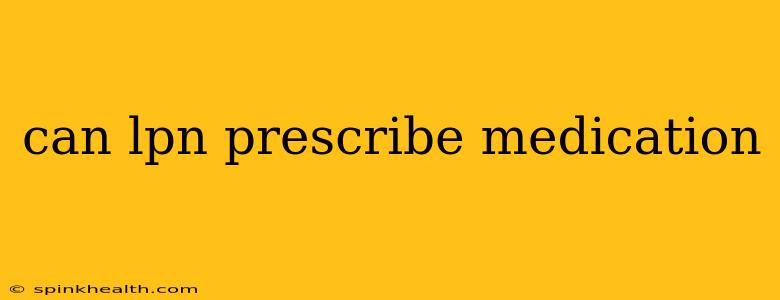Can LPNs Prescribe Medication? The Complex Answer
The question of whether Licensed Practical Nurses (LPNs) can prescribe medication is a complex one, with the answer varying significantly depending on location and specific regulations. The short answer is: generally, no, LPNs cannot prescribe medication. However, there are nuances to this rule that we need to explore.
Let's delve into the intricacies of this question, unraveling the factors that influence an LPN's scope of practice.
What are the Responsibilities of an LPN?
LPNs, also known as Licensed Vocational Nurses (LVNs) in some states, provide basic nursing care under the supervision of physicians, registered nurses (RNs), or other healthcare professionals. Their duties typically include:
- Monitoring vital signs: Taking patients' temperature, blood pressure, pulse, and respiration rate.
- Administering medications: While they can administer medications as prescribed by a doctor or RN, they cannot prescribe them.
- Wound care: Cleaning and dressing wounds.
- Collecting specimens: Gathering samples for lab testing.
- Providing patient education: Instructing patients on medication management, wound care, and other health-related topics.
- Assisting with ADLs: Helping patients with activities of daily living, such as bathing and dressing.
It's crucial to note that the specific tasks an LPN can perform are defined by their state's Nurse Practice Act. These acts outline the legal scope of practice for all levels of nursing professionals.
Can LPNs Prescribe Medication under any Circumstances?
While LPNs generally cannot prescribe medication, there are limited exceptions, usually involving collaborative practice agreements or protocols established within specific healthcare settings. These exceptions are rare and usually involve very specific circumstances, such as:
- Under a Collaborative Practice Agreement: In some states, LPNs may be allowed to prescribe certain medications under a collaborative practice agreement (CPA) with a physician or other authorized prescriber. This agreement outlines specific conditions, medication types, and patient populations for which the LPN can prescribe. This is not a common practice, and the specific regulations vary widely by state.
- Following Protocols: Some facilities might have established protocols or standing orders that permit LPNs to administer certain medications in specific situations. This often occurs in long-term care facilities or other settings where there is established physician oversight and clear guidelines. However, they are still following a prescribed protocol; they are not independently choosing the medication or dosage.
What about other Medical Professionals?
It's important to contrast the LPN's role with that of other healthcare professionals:
- Physicians (MDs/DOs): Physicians are fully licensed to diagnose illnesses and prescribe medications.
- Nurse Practitioners (NPs): NPs have advanced education and are authorized to diagnose, treat, and prescribe medications in many states. Their prescribing authority is often broader than that of LPNs.
- Physician Assistants (PAs): PAs, working under the supervision of a physician, can also prescribe medications in many states.
Why Can't LPNs Generally Prescribe Medications?
The primary reason LPNs cannot generally prescribe medications is their educational level and scope of practice. Their training focuses on providing basic nursing care under supervision, not on the complex diagnostic and treatment decision-making involved in prescribing medications. Prescribing medications carries significant responsibilities and potential risks, requiring a higher level of education and training.
This information is for general knowledge only and should not be considered medical advice. Always consult with a qualified healthcare professional for any health concerns or before making any decisions related to your health or treatment. State laws regarding LPNs prescribing medication can change, so it is essential to consult your state's Nurse Practice Act for the most up-to-date information.

